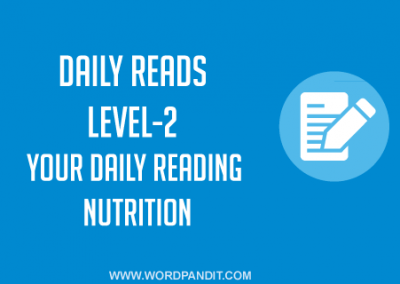Reading Suggestion-1
Article Name: From religious reflection to mummy vlogs: diaries through the ages
Author Name: John Mullan
Source: Newstatesman
Category: Books
Summary for this article:
Are you in the habit of diary writing? Either a physical format or a digital one. But are you used to writing your daily activities in that little book?
In this article, the author says how diary writing over the ages have taken different forms.
In the earlier centuries, diary writing was closely related to religion; it contributed to presenting a record of one’s own reflection through the course of the day to God. This acted as an introspection, thus enabling a person to reflect at his/her own dealings with Life
The author goes on to describe how the customised diaries during the later stages attracted people to fill in their details in a prescribed space having relevant titles for what needs to be filled. He further displays some contradictory attitudes towards Diary writing.
While diaries serve the purpose of being a private witness to one’s own acts, yet, in more recent forms, diaries are rather serving the purpose of displaying one’s accounts publicly.
The author concludes by giving an account of Keith Vaughan’s final writing into his diary, just before his death, not failing to show his devotion to this daily ritual – Diary Writing.
Words to learn from this article:
Droll: Someone who is funny or humorous in an unusual way
Waned: A gradual decline in something
Sloth: Too lazy to make an effort to do soemthing
Weave: To form a piece of fabric by interlacing long threads passing in one direction with others at a right angle to them.
Fastidious: Someone who pays attention to small details and wants everything to be perfect and correct.
Incarnation: An individual who embodies in the flesh a deity, spirit, or quality.
Barbiturate: A drug derived from the barbituric acid used for the purpose of inducing sleep
Reading Suggestion-1: Click to read full article
Reading Suggestion-2
Article Name: When television was a medical device
Author name:Jeremy A. Greene
Source: Humanities
Category: Technology and Health Care
Summary for this article:
We live in a world, where we do things at the click of a button. Life has become so much easier and better with the advent of the media. The media today has helped revolutionize so many sectors in our life – Including health care. Today doctors can visually communicate with a patient; digital learning for medical students at distance and remote places is possible; at the click of a button an individual can book an appointment with the doctor, check his specialization, reviews and much more. Technology is growing at a much larger pace in revolutionizing the health sector.
In this article, the writer attempts to help us understand the medical history of television when it was still considered as a form of media which was relatively new and drew attention because of its transformative potential in medical science. The author presents the works of Benschoter and her contemporary Kenneth Bird who ran an experimental television field station at Boston’s Logan Airport in the late 1960s to the early 1970s.
Words to learn from this article:
Aural: Sense of hearing
Prognosis: The prediction of the future outcome of a medical condition
Instantaneity: Something that happens immediately without any delay
Psychotherapy: The treatment of a mental disorder by psychological means rather than medical
Doggerel: A verse that is composed of irregular rhythm and is loosely styled to produce a comic effect
Reading Suggestion-2: Click to read full article
Reading Suggestion-3
Article Name: Why swearing makes you stronger?
Author name: Alan Burdick
Source: The New Yorker
Category: Society
Summary for this article:
How often do we find ourselves using swear words? And how often do we see people screaming swear words through the big entertainment boxes that we watch daily? Very often, right? But have you ever heard anyone talking about the positive impact that these words have on an individual? Definitely not. But here’s an interesting article that shows how Profanity has helped the masses rather than doing the opposite.
In this article, the writer says how profanity has lost its vulgar appeal over the years and how its usage makes an individual stronger when in pain!
Profanity is the new normal, he says!!
In the first para the writer talks about Donald Trump’s common usage of swear words and
how he is ok to say them aloud in Public without allowing them to be censored.
Profanity has different impacts on an individual, mostly it has to with creating a positive impact; this result is the outcome of various studies on profanity. While some studies say that using swear words maybe a form of pain management, the others suggest that it bolsters physical pain. Swearing is the fundamental part of the emotion and is generated by the parts of the brain from where emotions arise as founded by the researchers from the Bristol University.
Stephens interest in swearing happened when his wife started profusely screaming out swear words while in labour. During his studies, he found that swearing can have two affects,
a) increases the tolerance of pain and it is an ultimate emotional language
b) brings about a general disinhibition
Either way, he says, when compared to the traditional times people are no longer shocked when they hear swear words now.
The writer concludes by saying that even if profanity loses its pain-relieving magic, as they are already diminishing in their meaning, we will soon find new profane words.
Words to learn from this article:
Expletive: An offensive word
Occult: To cover from a view or an exposure
Profanity: Type of language involving obscene words and phrases.
Dynamometer: An instrument that is used for measuring mechanical force
Profuse: An excess amount of something













